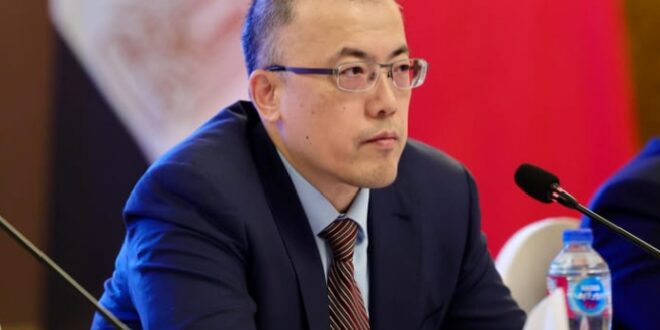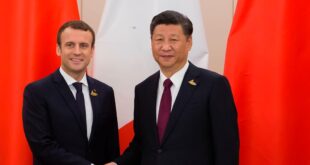By: Wagdy Abdelaziz
In a seminar held in Cairo this morning, Zhang Tao, Chargé d’Affaires of the Chinese Embassy in Egypt, delivered a comprehensive speech, dedicating its second part to the Shanghai Cooperation Organization (SCO) Summit held in Tianjin in 2025, describing it as “the largest and most fruitful” in the organization’s history.
The event was attended by prominent Egyptian figures, including Ambassador Amr Hamza, Assistant Foreign Minister for Asian Affairs, Minister Plenipotentiary Mohammed bin Siddiq of the League of Arab States, Ambassador Ezzat Saad, Secretary-General of the Communist Party Salah Adly, and Ambassador Ali El-Hefny, President of the Egyptian-Chinese Friendship Association.
Zhang highlighted China’s leading role in fostering international cooperation and reforming global governance, emphasizing its commitment to maintaining global peace and development.
A Milestone in SCO History
Zhang began his remarks on the Tianjin Summit by referencing the military parade held in Beijing on September 3, 2025, which showcased China’s strength and determination to safeguard peace and development. However, it was the Tianjin Summit that reflected China’s “strong political will” to reform the global governance system.
Chaired by Chinese President Xi Jinping, the Summit included the SCO Heads of State Council meeting and the “SCO+” meeting, where 23 leaders or representatives, including Egyptian Prime Minister Dr. Mustafa Madbouly, alongside 10 officials from international organizations, convened to discuss matters of friendship, cooperation, and development.
In his keynote address, President Xi outlined the “Five Principles” that formed the core of the Summit: seeking common ground while shelving differences, pursuing mutual benefits and win-win outcomes, embracing openness and inclusivity, upholding justice and fairness, and prioritizing pragmatism and efficiency.
Zhang explained that these principles embody the modern interpretation of the “Shanghai Spirit” and were met with appreciation and positive responses from participating leaders.
Long-Term Strategy and a Just Stance
The Summit produced the “SCO Development Strategy for the Next Decade,” aimed at enhancing unity and cooperation. Attendees reaffirmed their support for the victory of World War II and endorsed the multilateral trading system.
The Summit also issued the “Tianjin Declaration,” which expressed deep concern over the escalation of the Israeli-Palestinian conflict, calling for a comprehensive and permanent ceasefire in Gaza, ensuring humanitarian aid access, and affirming that a just and comprehensive resolution to the Palestinian issue is the only path to peace in the Middle East.
Zhang emphasized that the Summit’s success would usher in a new phase of high-quality development for the SCO, marking a milestone in its history.
Global Governance Initiative: A Vision for a Fairer World
According to Zhang, the Summit’s most significant highlight was President Xi’s proposal of the Global Governance Initiative, which addressed three major challenges facing international mechanisms: the underrepresentation of the Global South, the erosion of these mechanisms’ influence, and the urgent need to enhance their effectiveness.
He stressed that the initiative responds to the aspirations of the world’s peoples and the needs of the times, receiving widespread acclaim from leaders and international organizations.
Five Core Principles
The initiative is grounded in five core principles: sovereign equality, adherence to international law, multilateralism, a people-centered approach, and a focus on action. Zhang clarified that reform does not mean dismantling the international system or building a new one outside its framework but rather strengthening the UN Charter and implementing governance based on consultation, joint contribution, and shared benefits to create a fairer and wiser global order.
During the seminar, Zhang distributed the “Conceptual Document of the Global Governance Initiative,” inviting attendees to review it.
Egyptian Support and Shared Aspirations
Zhang noted the participation of Egyptian President Abdel Fattah El-Sisi and President Xi in the recent virtual BRICS Summit, where Xi underscored the importance of the initiative, while Sisi called for promoting multilateralism against unilateralism and protectionism, emphasizing the need for a balanced international system based on mutual respect and shared benefits.
Zhang explained that the Global Governance Initiative is part of a broader Chinese vision that includes the Global Development Initiative, Global Security Initiative, and Global Civilization Initiative, which collectively aim to foster stability in a turbulent world.
Strategic Partnership with Egypt
Zhang underscored the Chinese-Egyptian relationship as a cornerstone of this vision, highlighting Prime Minister Madbouly’s attendance at the Tianjin Summit on behalf of President Sisi and commending Egypt’s steadfast support for China on issues such as Taiwan. He noted the growing momentum in bilateral cooperation, with the integration of China’s Belt and Road Initiative with Egypt’s Vision 2030, and expressed optimism for increased Chinese investments in Egypt.
Zhang’s speech comes amid rising geopolitical challenges, reflecting China’s commitment to a responsible leadership role in promoting peace and development.
The seminar, which brought together a distinguished group of Egyptian officials, strengthened bridges of communication between the two nations, with anticipation for tangible outcomes from bilateral and multilateral cooperation within the SCO framework and China’s global initiatives.
 موقع وجه أفريقيا موقع وجه أفريقيا هو موقع مهتم بمتابعة التطورات في القارة الأفريقية
موقع وجه أفريقيا موقع وجه أفريقيا هو موقع مهتم بمتابعة التطورات في القارة الأفريقية



